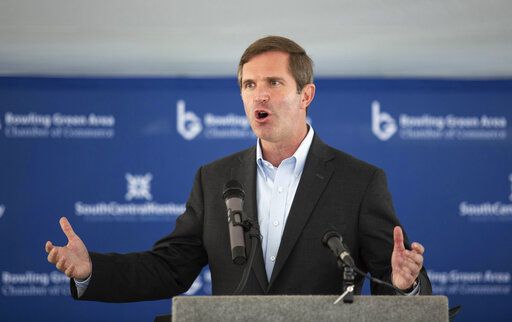Groundbreaking advances emerging vehicle battery production
Gov. Andy Beshear speaks at the groundbreaking ceremony for the new $2 billion, 3-million-square-foot Envision AESC electric vehicle battery technology gigafactory to be constructed in the Kentucky Transpark in Bowling Green, Ky., Tuesday, Aug. 30, 2022. The Envision AESC gigafactory at Bowling Green in south-central Kentucky will produce battery cells and modules that will power electric vehicles produced by multiple automakers. (Grace Ramey/Daily News via AP)
Kentucky reached another stage in developing an electric vehicle battery sector Tuesday, with groundbreaking for a $2 billion plant by a Japanese company that will create 2,000 full-time jobs.
The Envision AESC factory at Bowling Green in south-central Kentucky will produce battery cells and modules that will power electric vehicles produced by multiple automakers.
“The EV batteries will be in vehicles all around the world, and we’re pretty proud they’re going to be made right here in Kentucky,” Democratic Gov. Andy Beshear said at the groundbreaking event with state and local officials.
Envision AESC U.S. Managing Director Jeff Deaton said the state and local support reflects a “shared ambition to be national leaders in the e-mobility transformation in the United States.”
The Bowling Green operation is expected to power up to 300,000 vehicles annually by 2027.
Kentucky House Speaker David Osborne, a Republican, said Tuesday that the project strengthens the Bluegrass State’s place in the emerging electric vehicle market.
Envision AESC announced it had picked the fast-growing college town last April. The sprawling factory will be built at the Kentucky Transpark at Bowling Green.
Warren County Judge-Executive Mike Buchanon called the groundbreaking a “monumental event.” At full employment, the project will generate more than $233 million in new spending in the community annually, he said.
The project represents one of the largest economic development investments ever in Kentucky and followed an even larger battery production announcement last year.
Ford and its battery partner, SK Innovation of South Korea, will build twin battery plants outside Glendale in central Kentucky. That $5.8 billion megaproject in Hardin County will create 5,000 jobs to produce batteries for the automaker’s next generation of electric vehicles.
The emerging EV battery segment will “reverberate” across many Kentucky communities, as battery producers attract suppliers opening plants in the state, Beshear said Tuesday. Deaton said the Envision AESC factory will provide “a catalyst for further investment in the local supply chain.”
The sector’s development already is paying dividends elsewhere, the governor said.
Last week, Advanced Nano Products, a supplier of carbon battery nanomaterials used in EV battery production, said it will locate a plant in Hardin County to supply EV battery plants throughout the region. The project will create 93 jobs.
Ascend Elements Inc., a producer of advanced battery materials made from recycled lithium-ion batteries, said recently it will invest $310 million and create 250 full-time jobs in Christian County in western Kentucky. Ascend’s Kentucky operation will serve a range of EV-related customers.
Beshear is expected to make his management of the state’s economy a cornerstone of his reelection campaign message in 2023. Kentucky last year posted records for job creation and investments and has posted record low unemployment rates for four consecutive months.
Kentucky’s ability to land projects like the Envision AESC factory show that despite policy disagreements, the governor and legislature “pull together in the same direction when it comes to delivering economic opportunities for the commonwealth,” Osborne said. Republicans have supermajorities in both legislative chambers.
Osborne and Republican Senate Pro Tem David Givens also pointed to GOP-backed measures they said helped fuel the state’s economic growth: state tax code changes, reduced regulations and the so-called “right-to-work” measure that prohibits requiring workers to join unions or pay union dues as a condition of employment.
Based on the company’s investment and employment projections, Envision AESC is eligible for a performance-based, forgivable loan from the state up to $116.8 million, the governor’s office said in a news release. The company also is eligible for training funds.


